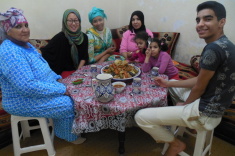On our way to and from Victoria Falls, Alex and I stopped near Bulawayo and spent the night with my neighbor’s nephew, Joe (not his real name). Joe is a large 35-year-old bachelor running a vegetable seed farm. I liked him, partially because he is living the same kind of solitude as I’m living, but his positivity toward it is inspiring.
Actually, his positivity toward everything is inspiring. Joe remembers losing his farm a decade or so ago. In 2001, a war vet approached his family and declared that they had received the title deed to the family farm. This was a typical Zimbabwean phenomenon, as the government gave out fake deeds to appease the masses without actually having to deal with the land redistribution problem.
Joe’s family went to court and managed to win the case (which was a rarity for white farmers in those times) because Joe’s grandfather had bought the farm in the early 1900s. The bone of contention for the war vets was that most of the land that whites were farming on had been given to them after WWI, but blacks hadn’t received the same benefit. Joe’s family hadn’t acquired their land by these methods, so it didn’t qualify for redistribution.
Nonetheless, two years later, the war vets came to Joe’s farm. It was the day of his younger sister’s funeral, who had died a few days earlier in a car accident. The war vets didn’t even wait for the funeral to be over – they demanded that Joe and his entire family pack up and leave the home within a few hours. As Joe’s father tried to negotiate with the leaders, he noticed several of his own workers in the mob.
That’s how it often went. Whether it was genuine desire for revenge against their employers or fear of retribution from their own community members, farm workers often became a large portion of the mob during takeovers.
Joe and his family packed in a hurry, fearing for their lives. They took only their essentials, leaving their net worth (roughly $11 million) to the “war vets” (many of who were too young to ever have fought in the 1980 War of Independence). Joe’s family was supposed to receive compensation from the UK, which offered to compensate their honorary citizens in these incidents. When they offered, Mugabe was happy to accept their help, so long as they gave the money to him and that he distributed it to the farmers himself. Wisely, the UK refused, but as such, the money Joe and his family need is still sitting, un-used, in the UK.
Like so many farmers, who now had no net worth, Joe has been forced to manage another man’s farm rather than his own. What I find so amazing, then, is the positive attitude that Joe still feels toward his work and his country.
Yes, he’s a self-admitted racist. He hates “black Africans” in general, as many white Zimbabwean farmers seem to. But his racism doesn’t extend to his encounters with individuals. When he meets a black man, he doesn’t lump them into the category with other “black Africans” because he now knows them and can judge them in a normal way, as we all do. He has several black friends, and many more black men that he respects.
What I find most enlightening is that Joe is an excellent manager. He respects his workers, and puts his money where his mouth is, paying more than any other farm in the area. He trains his workers and teaches them to have pride in their work. Their farm is a little community, and all the workers seem happy.
The farm itself is a strange venture. With the help of seed scientists, they are creating hybrid seeds of a variety of fruits and vegetables which, once perfected (as in, made to be strong varieties, with high yield, resistance to pests, etc.), will be sold worldwide to farmers. Though I am personally in complete disagreement with this practice (see any Michael Pollan book for more info as to why that is), I like Joe. He was open-minded, talkative, and generous. Alex and I learned a lot from him by listening to his stories and his perspective on his country’s past and future.
And his little kitties were adorable as well!



